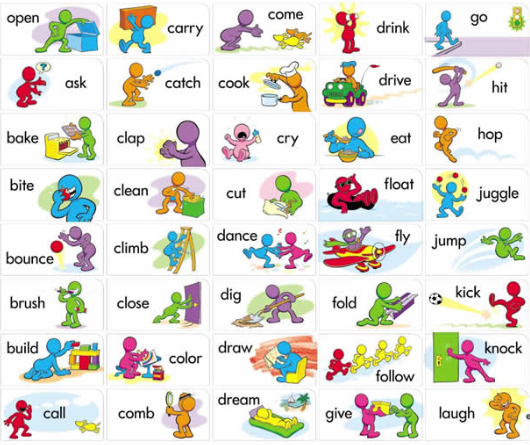Dealing with verbs
|
All words are classified at the word level into word classes such as nouns, adjectives, adverbs, prepositions and a few more. Not all parts of speech, however, are used in every clause. BUT every clause must have one particular part of speech: a verb. A verb is the word that expresses an action, condition or state of being. To find the verb in any sentence, just ask what is the subject doing? The answer will be the verb. Look at the following examples:
In the first sentence, what did the subject, 'visitor,' do? The visitor 'walked.' So 'walked' is the verb in that sentence. In the second sentence, what is the subject, 'play,' doing? The play 'was.' So 'was' is the verb in that sentence. This second example is a verb that shows a state of being instead of a straight action.
|
Verb Phrases: Structure and Examples
The examples listed above are the simplest kind of sentence. Each has just one subject and one verb. However, most of the time you use much more complex words to express more specific situations, like this:
This sentence is very similar to the examples above. But there is one important difference: the time frame. In the sentence with the verb 'was,' the action is in past tense. The play had been told and was no longer being told. What is the action in the second version? What is the subject, 'play,' doing? The play 'might be.' It is still expressing a state of being, just a different state of being. Instead of the past, it is still occurring and is therefore in the present tense. What is added to the second version to change the tense? You should see that the word 'might' is what makes the difference.
'Might' is called a helping verb, or auxiliary verb. Helping verbs aid the main verb in expressing time or action. The main lexical verb in this case is 'be.' When helping verbs appear in sentences instead of a simple verb, this is a verb phrase. A verb phrase consists of a main verb and one or more helping verbs linked together.
The examples listed above are the simplest kind of sentence. Each has just one subject and one verb. However, most of the time you use much more complex words to express more specific situations, like this:
- The play might be endless.
- The play could have been better
This sentence is very similar to the examples above. But there is one important difference: the time frame. In the sentence with the verb 'was,' the action is in past tense. The play had been told and was no longer being told. What is the action in the second version? What is the subject, 'play,' doing? The play 'might be.' It is still expressing a state of being, just a different state of being. Instead of the past, it is still occurring and is therefore in the present tense. What is added to the second version to change the tense? You should see that the word 'might' is what makes the difference.
'Might' is called a helping verb, or auxiliary verb. Helping verbs aid the main verb in expressing time or action. The main lexical verb in this case is 'be.' When helping verbs appear in sentences instead of a simple verb, this is a verb phrase. A verb phrase consists of a main verb and one or more helping verbs linked together.
